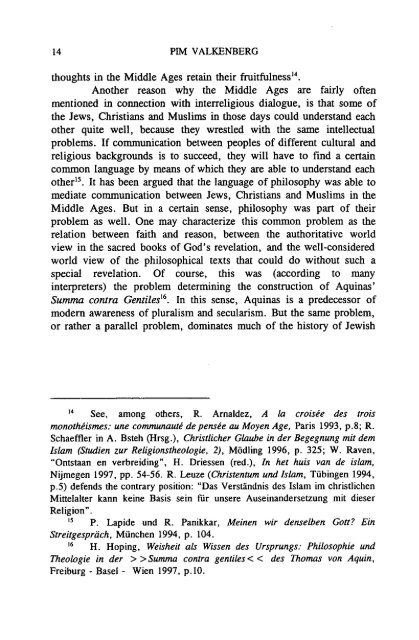Jaarboek Thomas Instituut 1997 - Thomas Instituut te Utrecht
Jaarboek Thomas Instituut 1997 - Thomas Instituut te Utrecht
Jaarboek Thomas Instituut 1997 - Thomas Instituut te Utrecht
You also want an ePaper? Increase the reach of your titles
YUMPU automatically turns print PDFs into web optimized ePapers that Google loves.
14 PIM VALKENBERG<br />
thoughts in the Middle Ages retain their fruitfulness".<br />
Another reason why the Middle Ages are fairly of<strong>te</strong>n<br />
mentioned in connection with in<strong>te</strong>rreligious dialogue, is that some of<br />
the Jews, Christians and Muslims in those days could understand each<br />
other qui<strong>te</strong> well, because they wrestled with the same in<strong>te</strong>llectual<br />
problems. If communication between peoples of different cultural and<br />
religious backgrounds is to succeed, they will have to find a certain<br />
common language by means of which they are able to understand each<br />
other IS. It has been argued that the language of philosophy was able to<br />
media<strong>te</strong> communication between Jews, Christians and Muslims in the<br />
Middle Ages. But in a certain sense, philosophy was part of their<br />
problem as well. One may charac<strong>te</strong>rize this common problem as the<br />
relation between faith and reason, between the authoritative world<br />
view in the sacred books of God's revelation, and the well-considered<br />
world view of the philosophical <strong>te</strong>xts that could do without such a<br />
special revelation. Of course, this was (according to many<br />
in<strong>te</strong>rpre<strong>te</strong>rs) the problem de<strong>te</strong>rmining the construction of Aquinas'<br />
Summa contra Gentiles", In this sense, Aquinas is a predecessor of<br />
modern awareness of pluralism and secularism. But the same problem,<br />
or rather a parallel problem, domina<strong>te</strong>s much of the history of Jewish<br />
14 See, among others, R. Arnaldez, A la croisee des trois<br />
monothéismes: une communauté de pensée au Moyen Age, Paris 1993, p.8; R.<br />
Schaeffler in A. Bs<strong>te</strong>h (Hrsg.), Christlicher Glaube in der Begegnung mit dem<br />
Islam (Studien zur Religionstheologie, 2), Mödling 1996, p. 325; W. Raven,<br />
"Ontstaan en verbreiding", H. Driessen (red.), In het huis van de islam,<br />
Nijmegen <strong>1997</strong>, pp. 54-56. R. Leuze (Chris<strong>te</strong>ntum und Islam, Tübingen 1994,<br />
p.5) defends the contrary position: "Das Verständnis des Islam im christlichen<br />
Mit<strong>te</strong>lal<strong>te</strong>r kann keine Basis sein für unsere Auseinandersetzung mit dieser<br />
Religion".<br />
IS P. Lapide und R. Panikkar, Meinen wir denselben Gott? Ein<br />
Streitgespräch, München 1994, p. 104.<br />
16 H. Hoping, Weisheit als Wissen des Ursprungs: Philosophie und<br />
Theologie in der > > Summa contra gentiles < < des <strong>Thomas</strong> von Aquin,<br />
Freiburg - Basel - Wien <strong>1997</strong>, p.lü.








